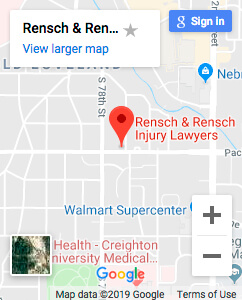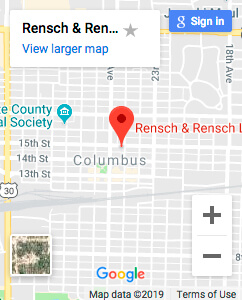What Is The Value of Life: Wrongful Death in Nebraska
 A wrongful death case isn’t about “getting back” at someone or suing a person out of anger or spite. In many cases, it’s about helping ease the financial burden of the surviving spouse or next of kin who have suddenly lost some or all of their financial support.
A wrongful death case isn’t about “getting back” at someone or suing a person out of anger or spite. In many cases, it’s about helping ease the financial burden of the surviving spouse or next of kin who have suddenly lost some or all of their financial support.
In other cases it’s about trying to somehow fill a void for the loss of service, society, comfort, and companionship of the close loved one, taken by the wrongful actions of another.
The law refers to a loved one who dies, as the “decedent”
Wrongful death actions in Nebraska are governed by §§ 30-809-810 of the Nebraska statutes. Those statutes have been interpreted and influenced by Nebraska’s Supreme Court and the Nebraska Court of Appeals. Many legal experts believe the seminal case in Nebraska on wrongful death, is Selders v. Armentrout (2.) 192 Neb. 291 (1979).
“Placing a dollar value on a person’s life might seem impossible, even unthinkable. But after a wrongful death, the financial needs of the surviving spouse and the next of kin, often lead to that grim calculation,” said veteran Omaha accident attorney Richard Rensch.
Rensch said when a loved one dies because of the intentional or negligent acts of another, that victim’s family can be expected to face the burden of significant medical and funeral expenses, along with future living expenses the decedent would have handled.
In that case, the surviving spouse or next of kin must ultimately consider the decedent’s net loss of financial contributions had the decedent lived. The survivors must also determine the value of the deceased loved one’s household services.
It’s a complex process that many times requires expert analysis into the decedent’s life expectancy and his or her earning capacity, at the time of death.
What exactly is “net” loss?
“The law requires the judge or jury to consider the value of what the deceased would have reasonably financially contributed during a normal life expectancy, subtracting income taxes. The amount the loved one would have personally consumed over his or her expected lifetime must be determined and subtracted as well,” said Rensch.
In Nebraska, the wrongful death statute of limitations is two years, (per § 30-810). With few exceptions, that means a wrongful death action must begin on behalf of the spouse and next of kin, within two years of the decedent’s death.
Also, per § 30-810 and Nebraska probate statutes § 30-2401 etc., a wrongful death action can only be brought by a court appointed personal representative of the deceased person.
Legislative bill LB878, just introduced in the Nebraska Legislature’s judiciary committee, aims to widen the allowable beneficiaries of these actions to persons such as stepchildren and step parents. The measure, introduced by Senator Les Seiler of Hastings, includes “dependent persons” as an additional group of beneficiaries.
However, because of vagueness of terms, the bill, if passed and made into law, could allow a number of unintended persons to qualify as wrongful death beneficiaries.
Who’s considered dependent? Seiler’s legislative assistant said the bill was meant only to cover step-children and step parents. Sean Rensch, Richard Rensch’s partner and son, said, “With the current language in LB878, you could argue that a dependent person also includes an unmarried domestic partner, a live-in girlfriend or boyfriend and a parent-in-law who was “dependent” on the decedent.
Sean Rensch continued, “Mr. Seiler’s legislative bill defines a dependent person as someone who receives more than one-half of his or her financial support from the loved one who died. The existing language of the LB878 would wreak havoc in future years.”
Experienced wrongful death attorneys must stay on top of the current laws surrounding this particular area of personal injury litigation. Members of Rensch and Rensch Law have been successfully handling wrongful death claims for decades. They advise those practicing in this area to be completely familiar with the most current edition of the Nebraska Jury Instructions. NJI 2d is considered the litigator’s bible, Rensch said. Experienced wrongful death lawyers must know the law.
In summary, Sean Rensch said “Nebraska’s wrongful death law restricts recovery to only financial loss. If the survivors can prove that the lost loved one would have been a source of great comfort and companionship to his or her spouse, parent or next of kin, and a monetary value for that loss can be shown, then damages may be awarded. It’s ultimately up to the jury.”
Sean Rensch cautioned, “Absolutely nothing can be awarded to the widow, parent or next of kin for mental suffering, bereavement or solace – over the death of a loved one. The law makes no allowance for grief. The law allows only damages as are shown by the evidence, to have a monetary value.”
These are the hard facts about Nebraska’s wrongful death laws. These laws appear to be here to stay.


